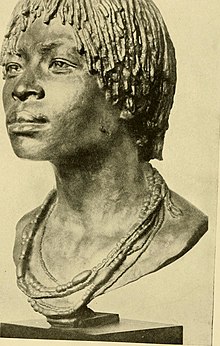Our website is made possible by displaying online advertisements to our visitors.
Please consider supporting us by disabling your ad blocker.
Kongo people
 A Kongo woman's cast from 1910 by Herbert Ward | |
| Total population | |
|---|---|
| 18,904,000[1][2] | |
| Regions with significant populations | |
| Languages | |
| Native languages: Kikongo, Kituba Lingala (minority) Second languages: French (DR Congo, Congo, Gabon) Portuguese (Angola) | |
| Religion | |
| Predominantly Christianity | |
| Related ethnic groups | |
| Basuku, Yaka, Téké and other Bantu peoples |
| Kongo | |
|---|---|
| Person | Musi Kongo, Muisi Kongo, Mwisi Kongo, Mukongo, Nkongo |
| People | Bisi Kongo, Esikongo, Besi Kongo, Bakongo, Akongo |
| Language | Kikongo |
| Country | Kongo dia Ntotila (or Ntotela), Loango, Ngoyo and Kakongo |
The Kongo people (Kongo: Bisi Kongo, EsiKongo, singular: Musi Kongo; also Bakongo, singular: Mukongo or M'kongo)[3][4] are a Bantu ethnic group primarily defined as the speakers of Kikongo.[5] Subgroups include the Beembe, Bwende, Vili, Sundi, Yombe, Dondo, Lari, and others.[6]
They have lived along the Atlantic coast of Central Africa, in a region that by the 15th century was a centralized and well-organized Kingdom of Kongo, but is now a part of three countries.[7] Their highest concentrations are found south of Pointe-Noire in the Republic of the Congo, southwest of Pool Malebo and west of the Kwango River in the Democratic Republic of the Congo, north of Luanda, Angola and southwest Gabon.[5] They are the largest ethnic group in the Republic of the Congo, and one of the major ethnic groups in the other two countries they are found in.[7] In 1975, the Kongo population was reported as 4,040,000.[8]
The Kongo people were among the earliest indigenous Africans to welcome Portuguese traders in 1483 CE, and began converting to Catholicism in the late 15th century.[7] They were among the first to protest slave capture in letters to the King of Portugal in the 1510s and 1520s,[9][10] then succumbed to the demands for slaves from the Portuguese through the 16th century. The Kongo people were a part of the major slave raiding, capture and export trade of African slaves to the European colonial interests in 17th and 18th centuries.[7] The slave raids, colonial wars and the 19th-century Scramble for Africa split the Kongo people into Portuguese, Belgian and French parts. In the early 20th century, they became one of the most active ethnic groups in the efforts to decolonize Africa, helping liberate the three nations to self-governance.[7]
- ^ "People Cluster - Bantu, Kongo | Joshua Project".
- ^ 40,5% of Rep of the Congo's population, 13% of Angola's population, 12% of DRC's population and 20 000 inhabitants of Gabon (Worldometers and CIA.gov).
- ^ Thornton, J. K. (2000). "Mbanza Kongo / São Salvador". In Anderson (ed.). Africa's Urban Past. James Currey Publishers. p. 79, note 2. ISBN 9780852557617.
...since about 1910 it is not uncommon for the term Bakongo (singular Mukongo) to be used, especially in areas north of the Zaire river, and by intellectuals and anthropologists adopting a standard nomenclature for Bantu-speaking peoples.
- ^ Wyatt MacGaffey, Kongo Political Culture: The Conceptual Challenge of the Particular, Indiana University Press, 2000, p.62
- ^ a b "Bakongo". Encyclopædia Britannica.
- ^ "Republic of the Congo - People | Britannica". www.britannica.com. Retrieved 2022-02-13.
- ^ a b c d e Appiah, Anthony; Henry Louis Gates (2010). Encyclopedia of Africa. Oxford University Press. pp. 14–15. ISBN 978-0-19-533770-9.
- ^ See Redinha, José (1975). Etnias e culturas de Angola. Luanda: Instituto de Investigação Científica de Angola.
- ^ Page, Melvin (2003). Colonialism: An International Social, Cultural, and Political Encyclopedia. ABC-CLIO. p. 773. ISBN 978-1-57607-335-3.
- ^ Shillington, Kevin (2013). Encyclopedia of African History (3-Volume Set). Routledge. p. 1379. ISBN 978-1-135-45670-2.
Previous Page Next Page


